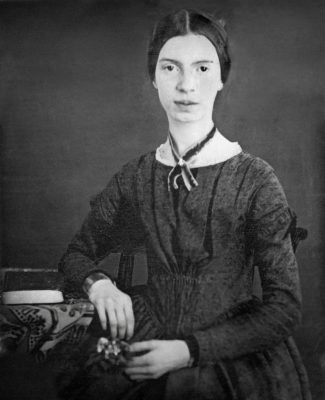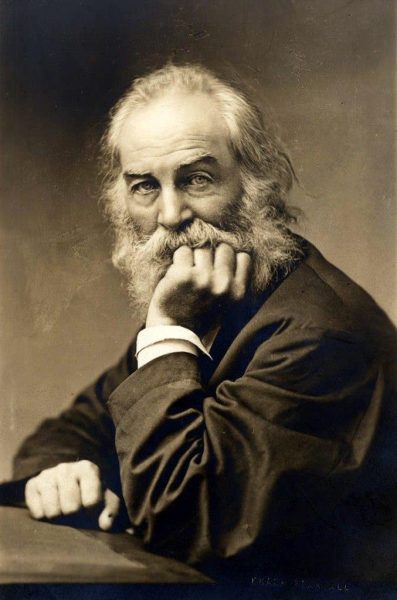~by Michaela Hayes
To wrap up CSU English’s celebration of LGBT history month, today we are taking a look at arguably two of the greatest poets of American history, and certainly the most influential of the 19th century– Emily Dickinson and Walt Whitman. Despite very different poetic styles, the two have a few things in common: they both originate from the East Coast, both were born in the early 1800s, and both are suspected by modern readers to be some variation of queer. Though homosexuality in and of itself has never been “new,” the word “homosexuality” was not actually coined until 1868. Even then and after, there were consequences from social to legal to being “out,” so it’s understandable that conversations around their sexuality are recent. Neither Dickinson’s nor Whitman’s sexual identity is confirmed, and most of the questions about the topic are modern concerns, based primarily on their poetry (and some letters), but one thing is for sure — they are both considered founders of a uniquely American poetic voice.

A word is dead when it is said, some say. I say it just begins to live that day. ~Emily Dickinson
Emily Dickinson was born in 1830 in Amherst, Massachusetts in the house that she spent nearly all of her life in. She was born to a prominent family, consisting of a brother, sister, father, and mother, whom she remained close to throughout her life. She attended a few schools away from home as a child, but returned before the age of 20. From then on she slowly transitioned into a life of solitude, seeing only her family on a regular basis. However, she kept many close friendships by way of letters and notes. Her letters have been published now, which seems like a violation of privacy to me, but they are very interesting.
Despite living most of her life as a hermit, much of her work focuses around society–both the society that she declined to live in and the societies she created within her poetry. She also wrote often about nature, death and dying, the Gospel, and many other themes too abstract to put into a few short words. I once had a professor tell my class “Emily Dickinson was a super genius. She’s smarter than all of you. I’m sorry.” Given that I often accidentally put deodorant on over my shirt and get briefly confused about it, he’s probably right.

We don’t read and write poetry because it’s cute. We read and write poetry because we are members of the human race. And the human race is filled with passion. So medicine, law, business, engineering… these are noble pursuits and necessary to sustain life. But poetry, beauty, romance, love… these are what we stay alive for. ~Walt Whitman
Walt Whitman was born in 1819 in West Hills, New York. Despite writing around the same time as Dickinson, his work differed greatly in form, and differed somewhat in subject matter. Whitman’s poetry is long, flowing, and grand while Dickinson’s is tightly structured and sharp. Both are considered influential poets in this way, but Whitman is sometimes credited as being “the father of free verse” as most other poetry in his time employed traditional meter and rhyme schemes.
Unlike Dickinson, Whitman was born to an uneducated lower-class family and had to work his whole life. He jumped from job to job, working as a school-teacher, journalist, government clerk, and volunteer nurse during the civil war. During his early years, Whitman spent his time wandering through New York City, reading, and writing but to no literary acclaim. In 1855, Whitman began his journey of becoming one of America’s great poets by publishing the first issue of Leaves of Grass, a slim chapbook consisting of about a dozen poems. Despite earning little notoriety from this first version, he sent the manuscript to Ralph Waldo Emerson who praised it highly.
Whitman was an extraordinary patriot, a theme which was often showcased in his poetry. Other themes include self-celebration, the cycle of growth and death, the beauty of the individual, and celebration of life in a general sense. Whitman’s poetry could be described as a flamboyant burst of confetti. Though his content matter is not always expressly “happy,” it is almost always centered around the beauty in the world.
Whitman continually added to Leaves of Grass throughout his life, which is now an enormous book chock-full of Whitman goodness. The first poem in the book, “Song of Myself,” is a nearly-manic anthem of self-love — “I celebrate myself, and sing myself.” You can read it here: https://www.poetryfoundation.org/poems/45477/song-of-myself-1892-version
In celebration of Walt Whitman, Emily Dickinson, and LGBT history month, let’s all celebrate and sing ourselves today. Let’s also celebrate that if these two poets were writing today, and were in fact a member of the LGBT community, they could have open about their sexuality if they chose to be. May the right of all poets, writers, teachers, artists, and humans to be exactly who they are stand, and may we readers continue to protect and honor that right.